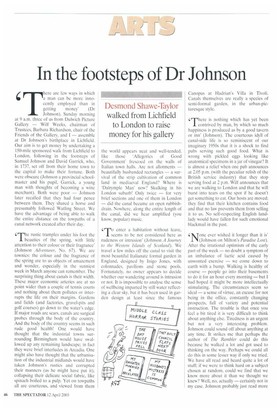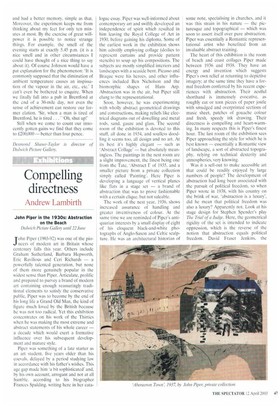In the footsteps of Dr Johnson
Desmond Shawe-Taylor walked from Lichfield to London to raise money for his gallery
c a man can be more innoent]3, employed than in are few ways in which (Dr Johnson). Sunday morning getting money' at 9 a.m. three of us from Dulwich Picture Gallery — Wilf Weeks, chairman of Trustees, Barbara Richardson, chair of the Friends of the Gallery, and I — assemble at Dr Johnson's birthplace in Lichfield. Our aim is to get money by undertaking a I50-mile sponsored walk from Lichfield to London, following in the footsteps of Samuel Johnson and David Garrick, who, in 1737, set off from their home town to the capital to make their fortune. Both were obscure (Johnson a provincial schoolmaster and his pupil, Garrick, a young man with thoughts of becoming a wine merchant). Both were poor — Johnson later recalled that they had four pence between them. They shared a horse and presumably followed Watling Street. We have the advantage of being able to walk the entire distance on the towpaths of a canal network created after their day.
rr he rustic tramples under his foot the
1 beauties of the spring, with little attention to their colour or their fragrance' (Johnson Adventurer, No. 67). We are townies: the colour and the fragrance of the spring are to us objects of amazement and wonder, especially in the sunniest week in March anyone can remember. The surprising thing about canals is their width. These major economic arteries are at no point wider than a couple of tennis courts and nothing about them pollutes or interrupts the life on their margins. Gardens and fields (and factories, gravel-pits and golf courses) go down to the water's edge. If major roads are scars, canals are surgical probes through the body of the country. And the body of the country seems in such rude good health! One would have thought that the industrial towns surrounding Birmingham would have swallowed up any remaining landscape; in fact they were brief interludes in Arcadia. One might also have thought that the urbanisation of the industrial midlands would have taken Johnson's rustics and corrupted their manners (as he might have put it), collapsing their delicate social fabric, like spinach boiled to a pulp. Yet on towpaths all are courteous, and viewed from them the world appears neat and well-tended, like those 'Allegories of Good Government' frescoed on the walls of Italian town halls. Are not allotments — beautifully husbanded rectangles — a survival of the strip cultivation of common land in mediaeval England? Where is 'Dalrymple Man' now? Skulking in his London suburb! Only twice — for very brief sections and one of them in London — did the canal became an open rubbishdrain. Nowhere, along the entire length of the canal, did we hear amplified (you know, popular) music.
Grrlo enter a habitation without leave,
1. seems to be not considered here as rudeness or intrusion' (Johnson A Journey to the Western Islands of Scotland). We travel a few miles off the canal to visit the most beautiful Italianate formal garden in England, designed by Inigo Jones, with colonnades, pavilions and stone pools. Fortunately, no owner appears to decide whether our wandering around is intrusion or not. It is impossible to analyse the sense of wellbeing imparted by still water reflecting a clear sky, but it has been used in garden design at least since the famous Canopus at Hadrian's Villa in Tivoli. Canals themselves are really a species of semi-formal garden, in the urban-picturesque style.
rrlhere is nothing which has yet been
1 contrived by man, by which so much happiness is produced as by a good tavern or inn' (Johnson). The courteous idyll of canal-side life is so reminiscent of our imaginary 1950s that it is a shock to find pubs serving such good food. What is wrong with pickled eggs looking like anatomical specimens in a jar of vinegar? It is almost a relief when one pub announces at 2.05 p.m_ (with the peculiar relish of the British service industry) that they stop serving food at 2 p.m. Wilf announces that we are walking to London and that he will burst into tears on the spot if he doesn't get something to eat. Our hosts are moved; they find that their kitchen contains food and that no law prevents them from selling it to us. No self-respecting English landlady would have fallen for such emotional blackmail in the past.
one ever wished it longer than it is' (Johnson on Milton's Paradise Lost). After the irrational optimism of the early part of the week — no doubt a symptom of an imbalance of lactic acid caused by unwonted exercise — we come down to earth with a bump. Walking is healthy of course — people go into their basements to do it for an hour every morning — but I had hoped it might be more intellectually stimulating. The circumstances seem so ideal — a sense of virtue, an excuse for not being in the office, constantly changing prospects, full of variety and potential instruction. The trouble is that once you feel a bit tired it is very difficult to think about anything else. Tiredness is an urgent but not a very interesting problem. Johnson could sound off about anything at any time. It strikes me that perhaps the author of The Rambler could do this because he walked a lot and got used to thinking on the way. Perhaps we could all do this in some lesser way if only we tried. We have all read and heard quite a lot of stuff: if we were to think hard on a subject chosen at random, could we find that we know more about it than we thought we knew? Well, no, actually — certainly not in my case. Johnson probably just read more
and had a better memory, simple as that. Moreover, the experiment keeps me from thinking about my feet for only ten minutes at most, By the exercise of great willpower it is possible to notice strange things. For example, the smell of the evening starts at exactly 5.45 p.m. (it is a nice smell and in other circumstances I could have thought of a nice thing to say about it). Of course Johnson would have a pat explanation for the phenomenon: 'It is commonly supposed that the diminution of ambient temperature causes an inspissation of the vapour in the air, etc., etc.' I can't even be bothered to enquire. When we finally fall into a pub in Brentford at the end of a 30-mile day, not even the sense of achievement can restore our former elation. 'Sir, when a man is tired of Brentford, he is tired . . "Oh, shut up!.
Still when we come to count our innocently gotten gains we find that they come to £200,000— better than four pence.
Desmond Shawe-Taylor is director of Dulwich Picture Ga!toy.



































































 Previous page
Previous page